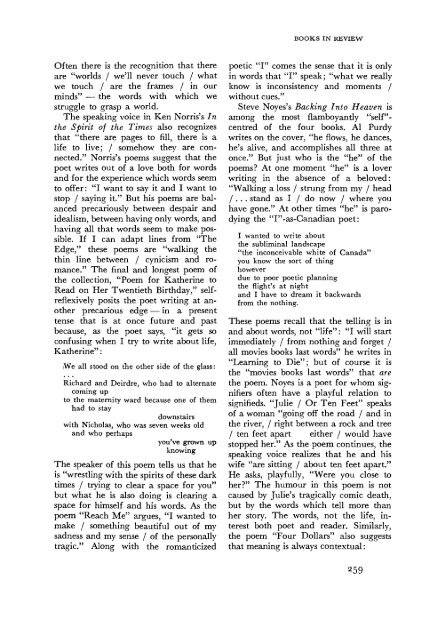шш in review DISCOURSE OF THE OTHER - University of British ...
шш in review DISCOURSE OF THE OTHER - University of British ...
шш in review DISCOURSE OF THE OTHER - University of British ...
You also want an ePaper? Increase the reach of your titles
YUMPU automatically turns print PDFs into web optimized ePapers that Google loves.
BOOKS IN REVIEWOften there is the recognition that thereare "worlds / we'll never touch / whatwe touch / are the frames / <strong>in</strong> ourm<strong>in</strong>ds" — the words with which westruggle to grasp a world.The speak<strong>in</strong>g voice <strong>in</strong> Ken Norris's Inthe Spirit <strong>of</strong> the Times also recognizesthat "there are pages to fill, there is alife to live; / somehow they are connected."Norris's poems suggest that thepoet writes out <strong>of</strong> a love both for wordsand for the experience which words seemto <strong>of</strong>fer: "I want to say it and I want tostop / say<strong>in</strong>g it." But his poems are balancedprecariously between despair andidealism, between hav<strong>in</strong>g only words, andhav<strong>in</strong>g all that words seem to make possible.If I can adapt l<strong>in</strong>es from "TheEdge," these poems are "walk<strong>in</strong>g theth<strong>in</strong> l<strong>in</strong>e between / cynicism and romance."The f<strong>in</strong>al and longest poem <strong>of</strong>the collection, "Poem for Kather<strong>in</strong>e toRead on Her Twentieth Birthday," selfreflexivelyposits the poet writ<strong>in</strong>g at anotherprecarious edge — <strong>in</strong> a presenttense that is at once future and pastbecause, as the poet says, "it gets soconfus<strong>in</strong>g when I try to write about life,Kather<strong>in</strong>e" :iWe all stood on the other side <strong>of</strong> the glass:Richard and Deirdre, who had to alternatecom<strong>in</strong>g upto the maternity ward because one <strong>of</strong> themhad to staydownstairswith Nicholas, who was seven weeks oldand who perhapsyou've grown upknow<strong>in</strong>gThe speaker <strong>of</strong> this poem tells us that heis "wrestl<strong>in</strong>g with the spirits <strong>of</strong> these darktimes / try<strong>in</strong>g to clear a space for you"but what he is also do<strong>in</strong>g is clear<strong>in</strong>g aspace for himself and his words. As thepoem "Reach Me" argues, "I wanted tomake / someth<strong>in</strong>g beautiful out <strong>of</strong> mysadness and my sense / <strong>of</strong> the personallytragic." Along with the romanticizedpoetic "I" comes the sense that it is only<strong>in</strong> words that "I" speak; "what we reallyknow is <strong>in</strong>consistency and moments /without cues."Steve Noyes's Back<strong>in</strong>g Into Heaven isamong the most flamboyantly "selfcentred<strong>of</strong> the four books. Al Purdywrites on the cover, "he flows, he dances,he's alive, and accomplishes all three atonce." But just who is the "he" <strong>of</strong> thepoems? At one moment "he" is a loverwrit<strong>in</strong>g <strong>in</strong> the absence <strong>of</strong> a beloved:"Walk<strong>in</strong>g a loss / strung from my / head/ . . . stand as I / do now / where youhave gone." At other times "he" is parody<strong>in</strong>gthe "I"-as-Canadian poet:I wanted to write aboutthe sublim<strong>in</strong>al landscape"the <strong>in</strong>conceivable white <strong>of</strong> Canada"you know the sort <strong>of</strong> th<strong>in</strong>ghoweverdue to poor poetic plann<strong>in</strong>gthe flight's at nightand I have to dream it backwardsfrom the noth<strong>in</strong>g.These poems recall that the tell<strong>in</strong>g is <strong>in</strong>and about words, not "life" : "I will startimmediately / from noth<strong>in</strong>g and forget /all movies books last words" he writes <strong>in</strong>"Learn<strong>in</strong>g to Die"; but <strong>of</strong> course it isthe "movies books last words" that arethe poem. Noyes is a poet for whom signifiers<strong>of</strong>ten have a playful relation tosignifieds. "Julie / Or Ten Feet" speaks<strong>of</strong> a woman "go<strong>in</strong>g <strong>of</strong>f the road / and <strong>in</strong>the river, / right between a rock and tree/ ten feet apart either / would havestopped her." As the poem cont<strong>in</strong>ues, thespeak<strong>in</strong>g voice realizes that he and hiswife "are sitt<strong>in</strong>g / about ten feet apart."He asks, playfully, "Were you close toher?" The humour <strong>in</strong> this poem is notcaused by Julie's tragically comic death,but by the words which tell more thanher story. The words, not the life, <strong>in</strong>terestboth poet and reader. Similarly,the poem "Four Dollars" also suggeststhat mean<strong>in</strong>g is always contextual :259
















